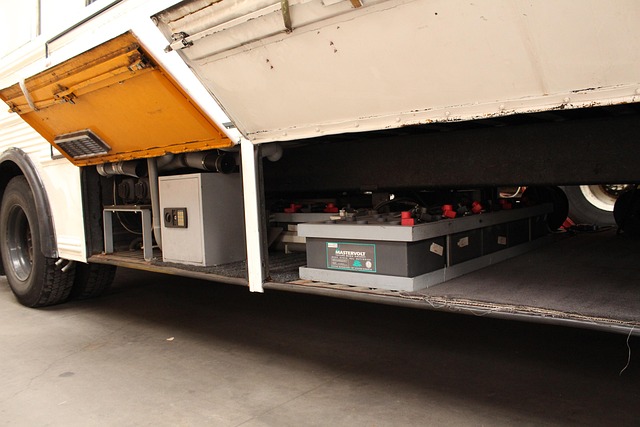Selecting and maintaining select trucks involves a strategic approach to ensure long-term performance and reliability. Top brands offer established maintenance routines for diverse conditions. Adhering to trucking regulations and tailored schedules reduces operational costs and downtime. Regular inspections, oil changes, tire pressure monitoring, and electrical system maintenance are crucial for optimal efficiency and safety in select trucks, enhancing fleet management strategies and sustainability.
Selecting a comprehensive truck maintenance schedule is key to ensuring optimal performance, safety, and longevity of your fleet. This guide delves into essential aspects of maintaining select trucks, focusing on understanding unique maintenance needs, identifying critical components for regular service, and setting timely inspection intervals. From oil changes and tire pressure monitoring to electrical diagnostics, discover best practices to keep your select trucks running smoothly and efficiently.
- Understanding Truck Maintenance Needs
- Identifying Critical Components to Service
- Setting Timely Inspection Intervals
- Regular Oil Changes and Filter Checks
- Tire Pressure Monitoring and Rotation
- Electrical Systems and Engine Diagnostics
Understanding Truck Maintenance Needs

Understanding Truck Maintenance Needs
Selecting the right truck involves considering more than just its specifications and features; it’s crucial to recognize that maintenance plays a pivotal role in the long-term performance and reliability of any vehicle, especially in the demanding world of heavy haul trucking. When it comes to select trucks, top brands known for their durability often come with established maintenance routines designed to keep them running smoothly year after year. These routines cater to the unique demands of various driving conditions and cargo types, ensuring optimal efficiency and safety.
In the realm of fuel-efficient semi-trucks, maintaining a rigorous yet tailored schedule can significantly reduce operational costs without compromising on performance. Moreover, staying compliant with heavy haul trucking regulations is paramount, as these guidelines often dictate specific maintenance intervals to ensure vehicles meet safety standards. By understanding these interconnected factors, trucking operations can optimize their fleet management strategies, enhancing overall efficiency and contributing to the sustainability of the industry.
Identifying Critical Components to Service

When it comes to maintaining select trucks, identifying critical components that require regular service is paramount. For any vehicle, but especially for heavy-duty trucks, a proactive approach to maintenance can prevent costly breakdowns and ensure optimal performance. Key components such as engines, transmissions, brakes, and tires are often the most vital areas to focus on. Regular inspections and servicing of these parts not only extend the lifespan of your select trucks but also enhance safety on the road.
Effective fleet tracking systems can play a significant role in this process by providing real-time data on vehicle performance and service needs. Leveraging heavy-duty truck maintenance tips from industry experts can further streamline the scheduling and execution of these services, ensuring that each truck is maintained at peak condition. This, in turn, contributes to improved fuel efficiency, reduced downtime, and enhanced overall fleet reliability.
Setting Timely Inspection Intervals

Selecting the right maintenance schedule for your select trucks is a critical aspect of efficient fleet management, especially for small business delivery vehicles. Regular inspections are key to minimizing downtime and maximizing performance. Timing these intervals strategically can help prevent costly repairs and ensure smooth operations. One effective approach involves setting milestones based on mileage or specific time periods, such as every 3,000 miles or every two months. This proactive maintenance routine accounts for the varying demands of different routes and driving conditions.
Utilizing fleet management software reviews can aid in optimizing these intervals by tracking vehicle performance data, identifying trends, and alerting you when routine services are due. By embracing digital tools, you gain valuable insights into the health of your small business delivery vehicles, allowing for more precise maintenance scheduling. This not only enhances overall efficiency but also contributes to cost-effectiveness in the long run.
Regular Oil Changes and Filter Checks

Regular oil changes and filter checks are an integral part of maintaining any vehicle, especially select trucks designed for long-haul or heavy-duty use. For those considering the best semi trucks for long hauls, prioritizing routine maintenance like these can significantly extend the life of your investment. The 10 most reliable trucks on the market today often have robust engines that demand regular attention to perform at their peak; neglecting basic upkeep could lead to costly repairs down the line.
Utility trucks for sale near me highlight the importance of not only replacing oil and filters but also ensuring these components are checked for any signs of damage or wear. This proactive approach, while seemingly mundane, plays a crucial role in preventing breakdowns during critical operations. By adhering to a consistent maintenance schedule, owners of select trucks can ensure their vehicles remain reliable companions on the road, whether navigating city streets or traversing vast open highways.
Tire Pressure Monitoring and Rotation

Maintaining optimal tire pressure is a vital aspect of selecting trucks for long-haul or frequent use. Proper inflation levels ensure fuel efficiency and extend tire lifespan, which is particularly crucial for drivers navigating challenging terrains. Regular monitoring systems, such as Tire Pressure Monitoring Systems (TPMS), have become standard in modern vehicles, including select trucks. These advanced technologies provide real-time data on tire pressure, alerting drivers to any discrepancies that could impact safety and performance.
Tire rotation is another critical component of truck maintenance. Since front and rear tires experience different levels of stress, a strategic rotation schedule ensures even wear patterns. This practice not only maximizes the lifespan of each tire but also contributes to improved handling and reduced risk of unexpected failures. For businesses offering refrigerated transport solutions or relying on commercial vehicle financing rates, efficient tire management is essential for minimizing downtime and maintaining operational efficiency across their fleets.
Electrical Systems and Engine Diagnostics

Regular electrical systems maintenance and engine diagnostics are crucial components of a comprehensive select truck maintenance schedule. For long-haul drivers operating best semi trucks, keeping an eye on these areas can prevent costly breakdowns and ensure smooth sailing. Electrical systems, responsible for powering lights, engines, and various accessories, require periodic checks to identify any faulty connections or worn-out components that could lead to unexpected issues during a journey.
Engine diagnostics play a vital role in maintaining the health of your select truck. Advanced diagnostic tools can detect even subtle anomalies in engine performance, enabling timely repairs. This is particularly important for small business owners relying on their trucks for operations; proactive maintenance through regular diagnostics can save them from unexpected downtime and the hassle of finding reliable full-service trucking companies for emergency repairs.
Selecting the right truck maintenance schedule is crucial for ensuring optimal performance, extending vehicle lifespan, and preventing costly breakdowns. By understanding your select truck’s unique needs, identifying critical components that require regular service, and setting timely inspection intervals, you can navigate the road with confidence. Remember to prioritize regular oil changes, tire pressure monitoring, and electrical system diagnostics for a smooth driving experience. Implement these maintenance practices to keep your select truck in top shape and avoid unexpected issues.
